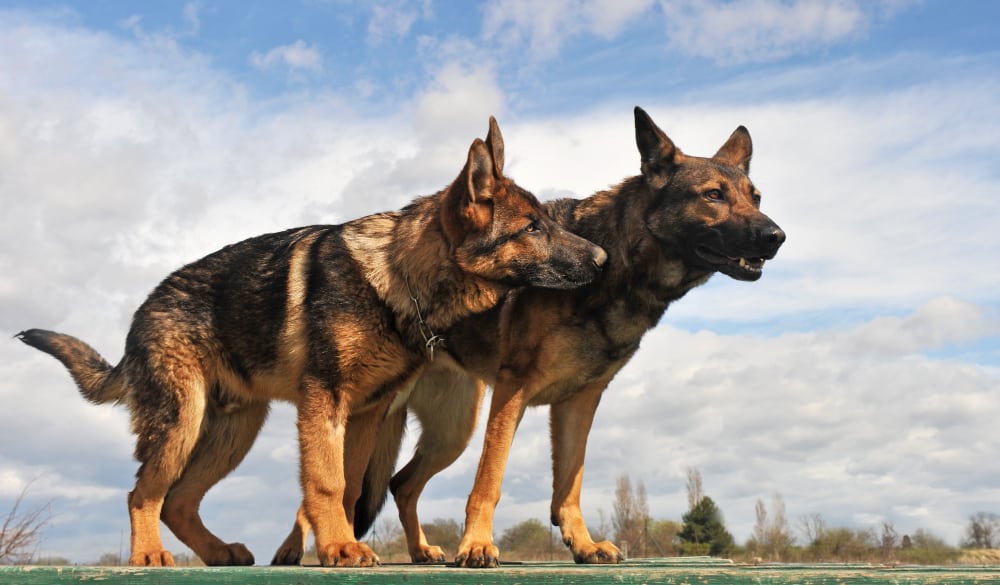When it comes to choosing a German Shepherd, one question that often arises is whether a male or female dog would be the best fit. While there is no inherent difference in temperament between male and female German Shepherds, it’s natural to want to know what to expect from each sex.
While German Shepherds typically have a confident, loyal, and calm temperament, there are slight differences seen in each sex. Female German Shepherds are easier to train, more affectionate, and have less roaming tendencies. Male German Shepherds are more territorial, and protective, and tend to make one-person attachments.
Whether you’re a seasoned German Shepherd owner or considering adding one of these wonderful dogs to your family, this post will help you understand the unique characteristics and temperament of these intelligent and loyal dogs.
The golden standard of the German Shepherd temperament
The German Shepherd has one of the most amazing temperaments you can find in a dog, hands down. (Yes, we can’t help but already put together an entire website on this breed so far.)
These dogs are confident, intelligent, courageous, protective, and loyal. Their loyalty makes them perfect as both one-person pets as well as family dogs. They are high-energy dogs who are easy to train and love to please their owners.
Due to their high guarding instincts, German Shepherds are usually cautious towards strangers. They are excellent with children and tend to get along well with other dogs once properly introduced.
Overall, a purebred German Shepherd should be a balanced and stable dog, with a calm and confident demeanor. They should be friendly and outgoing with people they know, but also alert and protective of their family when necessary.
Watch this video for a quick run on male vs female German Shepherds:
What’s in a dog’s temperament?
Temperament refers to a dog’s personality, character, and behavior. It encompasses a wide range of traits, including a dog’s energy level, playfulness, sociability, aggression, trainability, and adaptability. A dog’s temperament is influenced by a variety of factors, including:
- Genetics
- Early socialization
- Training
- Life experiences
Genetics play a significant role in a dog’s temperament, as certain breed traits are passed down from the parents. That’s what makes a German Shepherd behave like a German Shepherd should. (Think of confident, fearless, loyal, intelligent, and all that good stuff…)
Early socialization can also have a major impact on a dog’s temperament. Puppies that are exposed to a wide range of people, places, and situations during the critical socialization period (around 3 to 12 weeks of age) are more likely to grow into confident and well-adjusted adults.
Proper training can also help shape a dog’s temperament, as it helps them learn to behave appropriately and follow commands.
A dog’s life experiences can also influence its temperament. For example, a dog that has been neglected or mistreated may have a more fearful or anxious temperament, while a dog that has been well-cared for and socialized may have a more confident and outgoing personality.
Overall, a dog’s temperament is a complex combination of genetics, early experiences, and life experiences. By understanding and shaping these factors, owners can help their dogs become well-adjusted and well-behaved members of the family.
Does a German Shepherd’s sex affect its temperament?
While your German Shepherd’s gender is not a sure determinant of its temperament, it indirectly influences a dog’s temperament. Your dog’s sex does have influences on its trainability, confidence, reactivity, territorial defense, aggressive dominance, and affection levels. All these factors come together to determine your German Shepherd’s temperament.
Personality differences can most clearly be seen between non-neutered females and males. Males are more dominant, territorial, and easily distracted than female dogs. On the other hand, males can also be more playful, active, and independent (Source: Pedigree).
According to Johanna Reel, a vet technician for NHS Natural Pet, many pet owners report that female dogs are easier to housetrain and are more attentive to their owners than male dogs. Despite this fact, male German Shepherds tend to be more affectionate and crave attention from their owners more than females.
Temperament vs personality in dogs
Temperament and personality are often used interchangeably when discussing dogs, but they can refer to slightly different aspects of a dog’s character.
Temperament refers to a dog’s natural disposition and tendencies, including their energy level, playfulness, sociability, aggression, trainability, and adaptability. It is largely influenced by genetics, early socialization, training, and life experiences. Temperament in dogs tend to be relatively stable over time.
Personality, on the other hand, refers to the unique qualities and characteristics that make a dog an individual. In other words, it’s more like a dog’s preference. It includes traits such as a dog’s likes and dislikes, and their individual quirks and mannerisms.
Personality can also be shaped by the same set of factors, including genetics, early socialization and training, and life experiences. It can, however, change and evolve over time as a dog matures and learns new things.
Overall, temperament and personality are both important aspects of a dog’s character, and they work together to influence a dog’s behavior and behavior. By understanding and shaping both temperament and personality, owners can help their dogs become well-adjusted and well-behaved members of the family.
Differences between male and female German Shepherd temperament
While both genders may look the same, they don’t always act the same way. Here are a few qualities that differentiate male and female German Shepherds.
| Male German Shepherd Temperament | Female German Shepherd | |
| Trainability | Less trainable | More trainable |
| Aggression | Slightly more | Less |
| Dominance | More | Less |
| Biting tendencies | More | Less |
| People possessiveness | More | Less |
| Property possessiveness | More | Less |
| Affection | Less | More |
| Independence | Less | More |
| Mood swings | Less prone | More prone |
| Territoriality | More | Less |
| Roaming | More | Less |
| Good with kids | Less | More |
| Good with other dogs | Less | More |
A closer look at the German Shepherd’s temperament: Male vs Female
There is no inherent difference in temperament between male and female German Shepherds. Both males and females can exhibit the desired traits of the breed, including intelligence, loyalty, and a strong work ethic.
However, there are slight temperamental differences associated with sex. Knowing these differences will make it easier for you to choose the German Shepherd that is right for you. We discuss the differences below.
Trainability
While all German Shepherds are typically easy to train due to their herding nature, male German Shepherds are a little more tasking to train than their feminine counterparts. This is because they are more playful, less focused, and biologically slower to mature. However, male German Shepherds make up for this deficiency with a strive to please their owners.
Female German Shepherds, on the other hand, are easier to train. This is due to their faster maturity and focused nature. In addition to this, female German Shepherds do not have an impulse for marking like the males and tend to empty their bladder in one spot. Hence, they are easier to housetrain.
Socialization
Generally, German Shepherds are loving companions. However, because of their territorial and protective nature, male German Shepherds are not often social butterflies. Males tend to develop a one-person connection more and suffer from separation anxiety more frequently (Source: Science Direct).
Female German Shepherds are amazing companion animals. They love to be with their pack and are well-suited for family living. They are also less possessive and territorial meaning that they react more pleasantly to strangers and other dogs. However, sex does not override the German Shepherd’s overall protective nature.
Possessiveness
According to research recorded in The Domestic Dog, characteristics most strongly associated with males were aggression toward family members, territorial defense, and aggression toward other dogs. Male German Shepherds are more possessive of people and resources than females. This makes them develop one-person connections more frequently.
Female German Shepherds are often calmer, less possessive, and less aggressive. They are also less likely to develop a one-person connection unless they are taken care of by one person. They also show less resource guarding than males because of their lower territoriality.
With children
Male German Shepherds tend to see kids as playmates. While this is a cute sight, male German Shepherds can get a little boisterous with kids. Research also shows that male German Shepherds are more aggressive and have more biting tendencies. However, in most cases, well-socialized male German Shepherds react pleasantly to kids.
Female German Shepherds are cool with children. Like the males, they are energetic and love to play with kids. They have a gentler nature and will often treat young children like their puppies. Note that children must be taught to properly interact with these dogs to prevent aggressive behavior.
German Shepherds are fiercely protective of their child companions. Watch this video to see German Shepherds’ protective qualities in play!
With other dogs
Due to their protective nature, male German Shepherds tend to be wary of other dogs when meeting them for the first time. You’ll mostly see them standing aloof while watching the other dogs. It takes some time for them to trust strangers. However, as soon as they can trust them, they will get along with other dogs.
Although female German Shepherds are fiercely protective too, they are not as territorial or possessive as the males. They tolerate other dogs better and do not mark territory like the males. If properly socialized, they will do fine with other dogs.
Which one is right for you- A male or female German Shepherd?
People get dogs for several reasons. These include companionship, protection, facilitating exercise, breeding, and service (Source: Frontiers in Veterinary Science). Here are questions to ask yourself to help you come to a decision.
Question 1: Why do you want a German Shepherd?
If you’d like to get a German Shepherd for herding or guarding purposes, you should get a male. Their possessiveness, territoriality, aggression, and higher biting tendencies make them perfect for such jobs.
On the other hand, if you’re looking for companionship or an exercise buddy, a female Shepherd might suit you better.
Question 2: Do you have experience raising a large breed dog?
Female German Shepherds are great for first-time owners. They are easier to train and manage. However, if you have successfully raised this breed or other large breeds before, you could get a male German Shepherd.
Question 3: Do you live alone?
If you live alone, a male German Shepherd is great for you because they often form one-person connections. However, male GSDs are more prone to separation anxiety so a lot of love, patience, and training is required.
Question 4: Do you live in a home with kids or other pets?
If you have kids or other pets, it is best to get a female German Shepherd. The reasons for this conclusion are explained in prior sections.
Final Thoughts
Both male and female German Shepherds have certain traits going for them. It is important to remember that each dog is an individual and should be evaluated based on its own temperament and behavior, rather than its sex.
Ultimately, your choice depends on the kind of temperament you are looking for as well as your lifestyle. When choosing a German Shepherd, it is important to do your research and select a responsible breeder who can pair you up with the perfect dog that matches your lifestyle and personality.



